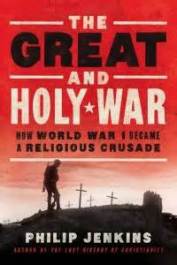Later this year, the 100th anniversary of the commencement of the First World War will arrive and, already, the flood of books about that terrible conflict has begun. The author of The Great and Holy War, Philip Jenkins, is a historian of religion, notably of Christianity in the global south, Mr. Jenkins makes a strong case for the pervasive and often sincere religiosity that affected both sides and for the war’s immense short term and long term consequences for various religions. He spreads his net very widely, discussing not only Europe and Christianity, but Judaism, Islam, and esoteric religions that we would label today as new age. He also deals with popular culture and attitudes as well as the rarefied ideas of thinkers such as Karl Barth and A. I. Kook. Here are just four examples:
Regarding Islam, the war destroyed the Ottoman Empire, and the caliphate did not long survive it. This caused great spiritual unrest amongst Muslims. One result was the creation of Saudi Arabia. Because of the absence of the caliphate,and the kingdom’s prestige (due to its incorporation of the holy city of Mecca) and its great oil wealth, its strict, Wahabi version of Islam has had significant influence on Sunni Muslims.
Regarding Judaism, as part of its war diplomacy, Britain issued the Balfour Declaration in 1917 that declared itself in favor of establishing a Jewish national home in what was then called Palestine. This had great consequences for the Jewish People and the development of the Jewish religion. (Although Mr, Jenkins does not mention this, the continuing development of the Hebraic religion from a portable, diasporic version to one rooted in the promised land can therefore, in a sense, be considered one of the long-term consequences of the war.)
Regarding Christianity, Mr. Jenkins argues that the misuse of religious language and concepts during the war (“Of necessity, messianic nations must have satanic foes.”) helped lead to the secularization of western Europe. At the same time, the extreme sufferings brought on by the war encouraged the growth of evangelical and pentecostal forms of Christianity which had been fairly marginal until then.
Regarding spirituality in general, during the First World War there were many reported visions and supernatural occurrences. Little if any of this sort of thing was reported in the Second World War.
This book is a rich concoction. It is somewhat stronger as history than as a work of analysis. That is, it tells more what happened than why it happened or what the significance is. A minor criticism I have is that the author tantalizingly speaks of the influence of the war upon Hinduism but then barely mentions that religion in the main body of the text. A more important criticism is that the citations are sometimes inadequate. For example, on page 264, Mr. Jenkins says that the kaiser stated in 1918 that Germany was fighting against an alliance of Jews and Freemasons, yet the author provides no citation for this. Also,frequently entire books are cited instead of specific pages within the books. Although this is sometimes acceptable,often it is not.
Despite these relatively minor shortcomings, the book is very informative and thought provoking and well worth the time of those interested in the history of religious ideas.


